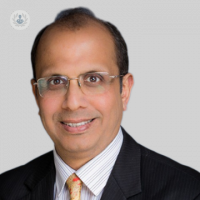The gastric sleeve procedure: a popular weight loss surgery
Written in association with:Gastric sleeve surgery is one of several procedures that assist with extreme weight loss by adjusting how the digestive system functions. The gastric sleeve procedure is a particularly common weight loss surgery due to its advantages and in this article, Mr Sanjay Agrawal (one of the UK’s prominent experts in obesity and weight-loss surgery) shares his expertise by answering common questions.

What is a gastric sleeve?
Gastric sleeve surgery is the most common bariatric procedure worldwide. Bariatric surgeries assist in extreme weight loss by changing how the digestive system works. A patient undergoing gastric sleeve surgery (aka a sleeve gastrectomy) will have their stomach size reduced. To reduce the size, about 80-85 per cent of the stomach is removed and the remaining tissue is reformed into a shape that resembles a sleeve.
Why is gastric sleeve surgery so popular?
There are multiple reasons for its increase in popularity over the last five to ten years.
- For surgeons, the gastric sleeve procedure is relatively less complex than other weight loss surgeries, such as gastric bypass surgery.
- From the patient’s perspective, it’s less invasive compared to other weight loss surgeries and therefore, it involves fewer risks to their health and a lower likelihood of complications.
- A gastric sleeve can be converted into a gastric bypass in the future if necessary. This is beneficial for both the surgeon and the patient.
Who is eligible for a gastric sleeve?
In order to qualify for gastric surgery, a patient must be within the BMI (body mass index) range category that indicates obesity, have tried all non-surgical methods of weight loss and, depending on their weight, have additional health risks.
A BMI within the 18.5 to 24.9 range is considered healthy, and 25 – 29.9 is considered overweight. A person with a BMI of 30 and above is considered obese and whether they have surgery or not depends on a few factors.
- Anyone with diabetes and a BMI of 30-34.5 is eligible. Non-diabetics in this BMI range are not.
- Anyone with an obesity-related illness (joint pain, heart disease, etc.) and a BMI of 35-39.9 is eligible. People without an obesity-related illness in this range are less likely to have gastric sleeve surgery.
- Anyone, despite having no other illnesses, with a BMI of 40 and above, can have gastric sleeve surgery.
Are there any complications and risks?
The gastric sleeve procedure is generally a very safe operation. However, as with any operation, there are mild risks associated with it such as wound infection, a reaction to general anaesthesia and discomfort in the first few days to weeks following the operation.
After gastric sleeve surgery, there are possible complications such as bleeding, staple line leak (when the staples used in the procedure open), injury to other organs and a narrowing of the gastric sleeve. However, these are uncommon.
There are also some long-term complications. For example, up to twenty per cent of gastric sleeve patients experience chronic heartburn. This can be controlled with medication although some may need a second surgery such as a gastric bypass.
All patients end up with nutritional deficiencies because they’re stomach can only handle much smaller portions than the average person. This is a result of all weight loss surgeries, not only gastric sleeve surgery. Patients will be advised by a nutritionist about vitamin and mineral supplements throughout life and are advised to have yearly blood tests to check for adequate levels of vitamin and mineral levels in their body.
How much weight will I lose after surgery?
The average person will lose about 50 to 60 per cent of their excess weight just by gastric sleeve surgery alone. However, the surgery is a tool and patients still have to work with it for the rest of their life to maintain long-term weight loss. This means monitoring their diet and increasing physical activity. If patients fall back into old habits, they’ll regain the weight.
If you’re falling back into old habits, consult a doctor or weight loss group for support. Mr Agrawal’s patients have set up a Facebook support group for people who have had or are considering weight loss surgery with him.
Mr Sanjay Agrawal is certified as a 'Master Surgeon in Metabolic and Bariatric Surgery™’ and is highly skilled in performing a range of procedures, including gastric sleeve surgery. Visit Mr Agrawal’s profile to learn more and to book a consultation.


